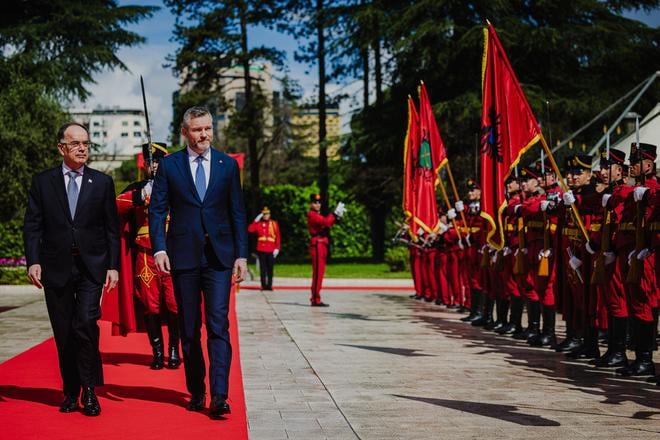One year ago, Peter Pellegrini won the Slovak presidency after a tightly contested race. He claimed to have spent no more than the legal campaign spending limit of €500,000. Yet only now is the murky truth about who financed his rise to power beginning to emerge, Sme daily reports.
Unlike his main rival, former diplomat Ivan Korčok, who ran a transparent crowdfunding campaign supported by thousands of small, publicly visible donations in real time, Pellegrini kept his finances under wraps. His team blocked external donations from being made directly to his official campaign account, instead funnelling all financial contributions through his political party, Hlas (which means “Voice” in Slovak).
At the time, Hlas claimed that the campaign had been funded by donations from supporters. But under Slovak law, political parties are only required to publish the names of all their donors in their annual financial reports — long after voters have gone to the polls.
Hlas has now published only a list of donors, naming 56 individuals. At least 46 of them were either members of Hlas or had run as candidates for the party in the 2023 parliamentary election. This was no spontaneous show of grassroots enthusiasm — it was a coordinated injection of cash from within the party’s ranks.
Generous donors
The most generous donor was Radomír Šalitroš, a rebel MP turned deputy minister, who contributed €55,000. In January, he admitted he regretted the donation after falling out with Pellegrini’s inner circle and being expelled from the party. Other top contributors include sitting ministers, MPs, and senior party figures. MP Peter Náhlik gave €20,000. During last year’s campaign, it emerged that Pellegrini had stayed at Náhlik’s house in the Bratislava borough of Vrakuňa and had used his private aircraft to travel to campaign events.
Former health minister Zuzana Dolinková donated €19,000; Deputy Prime Minister Peter Kmec gave the same amount; and prominent party figure Denisa Saková, who currently serves as economy minister, donated €16,000. Even MP Ján Ferenčák, who last week publicly denied making a donation, appears on the list as having contributed €5,000.
Some of the donations have raised eyebrows. Businessman Lukáš Mlynárik and employees from his financially struggling social enterprise in the town of Banská Štiavnica, central Slovakia, contributed a combined €90,000 — a sum many observers doubt they could realistically afford. Among the listed donors is also Tibor Piršel, a former lawyer for the notorious Takáč organised crime group. Another donor was Vojtech Ferencz, who gave €5,000 and was recently appointed head of the state gas utility, SPP, by the current government.
Missing money
Although Hlas reported €446,000 in large donations, over €50,000 remains unaccounted for. Transparency International Slovakia has noted that this gap might be explained by a number of small donations under €1,600 — the legal threshold above which individual donations must be publicly disclosed. However, because Pellegrini's campaign lacked a transparent account, there is no way to verify this at present.
“Full public oversight of the president’s campaign financing is impossible,” said Ľuboš Kostelanský of Transparency International Slovakia, “because smaller donors are not listed on the party’s website. Hlas will only publish those names in its annual report.”
The watchdog group suspects that Pellegrini may not have had sufficient funds during the campaign itself and instead relied on Hlas to cover the shortfall after the fact — which could amount to a violation of campaign finance rules, as donations are not permitted after the campaign period ends.
Suspiciously tight spending figures
Transparency International has also raised questions about the campaign’s declared spending. Although both leading candidates claimed to remain within the legal limit, Pellegrini’s reported expenses were just €471 less than Korčok’s — an improbably close figure, they argue. The Interior Ministry, now headed by Hlas party leader Matúš Šutaj Eštok, has yet to issue a decision on several formal complaints regarding potential breaches of campaign finance laws.
Hlas already has a track record of financial opacity. In 2022, the party quietly edited its online donor list after journalists uncovered inconsistencies.


 Slovak President Peter Pellegrini (second from left) and Albanian President Bajram Begaj during a welcome ceremony in Tirana on Friday, 28 March 2025. This marked the first official visit by a Slovak head of state to Albania since Slovakia became independent. (source: Office of the President of the Slovak Republic)
Slovak President Peter Pellegrini (second from left) and Albanian President Bajram Begaj during a welcome ceremony in Tirana on Friday, 28 March 2025. This marked the first official visit by a Slovak head of state to Albania since Slovakia became independent. (source: Office of the President of the Slovak Republic)